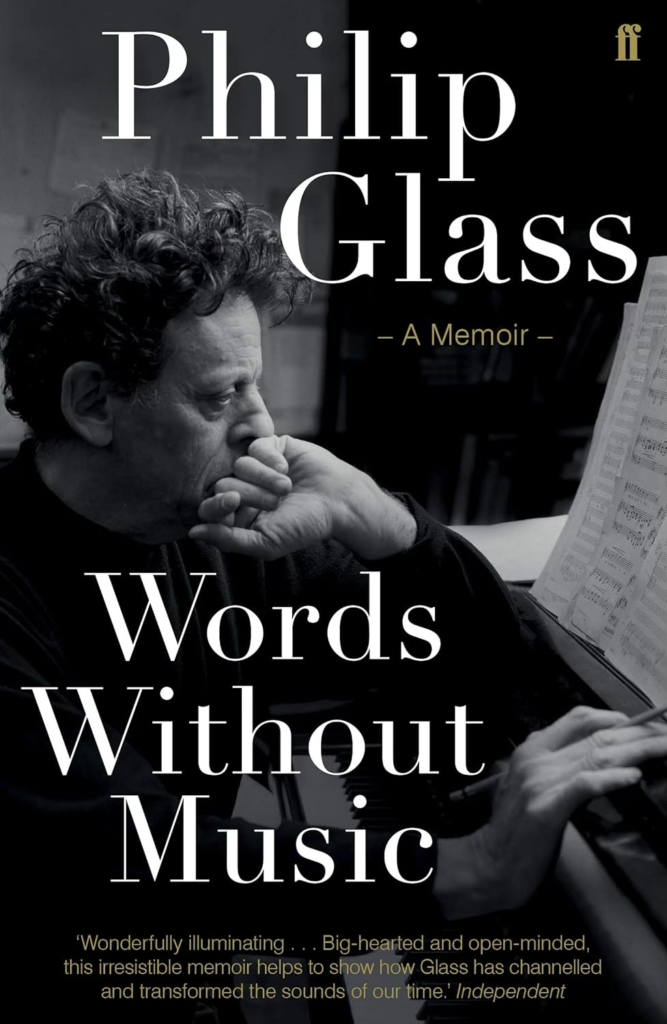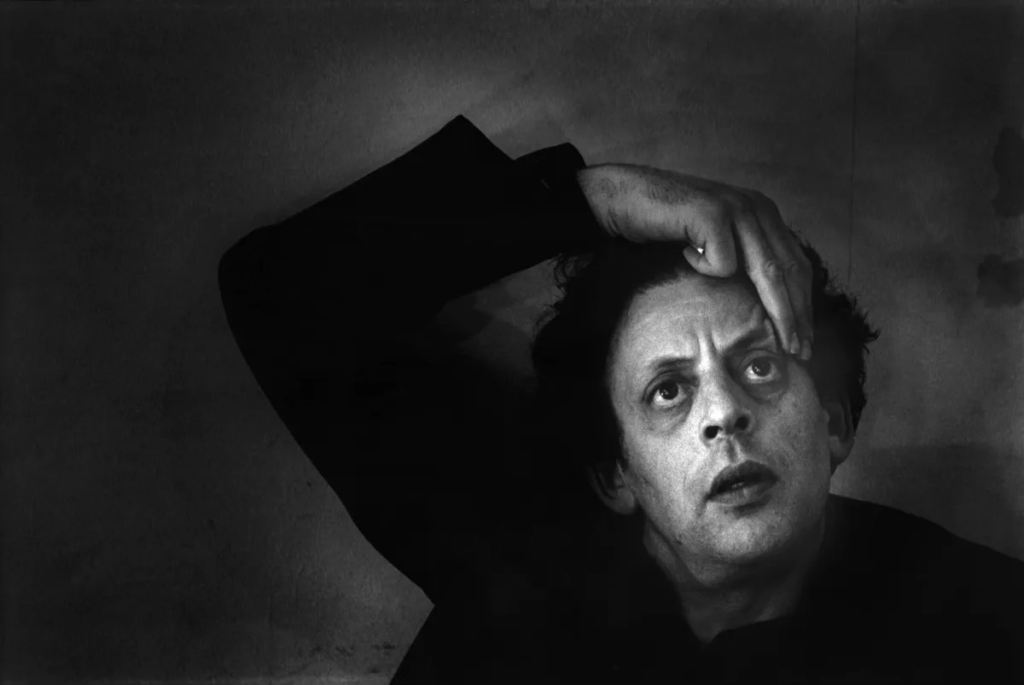
WORDS WITHOUT MUSIC
(Source: www.amazon.com.tr)
Philip Glass (1937-) is an American composer and pianist. Growing up, he took violin, flute and piano lessons, while his mother worked as a librarian, and his father ran his record store. In 1952, Philip enrolled at the University of Chicago.
To the influence of the classical music his father was listening to, was added the influence of jazz his friends introduced him to. He says the influence of jazz appeared later in his career, but ‘a flow of energy that seemed unstoppable, a force of nature’ he found especially in bebop became his constant focus throughout his career.
He started studying composition at Juilliard in 1958. He found Juilliard’s view that composition students need not perform unacceptable- ‘The important point is that a work of art has no independent existence’- referring to Cage’s view that audience completes the work. Listening being part of the creative process, by the audience and the performer, is a subject he contemplates all throughout his career.
In 1964, he was granted a scholarship to study with Boulanger in Paris. He married actress Joanne Akalaitis two years later, and with her and her friends they founded a theater company where Philip wrote the music, and worked at for many years. Through Ravi Shankar and others, he was introduced to Indian music. The first contemplations of rhythmic structures were born around this time, as he saw that ‘even complex patterns of music could be understood as groupings of twos and threes’.
With Boulanger he acquired technique- he says without which authenticity is impossible, and with which he is better able to hear music/formulate ideas with a musical language. He says Boulanger taught through fear, and Shankar through love, and ‘I have to say the benefit of each is about the same’.

(Source: www.whitney.org)
Throughout his life, Philip continued his studies and practices in spirituality all over the world- through hatha yoga, Tibetan Buddhism, Taoism and the Toltecs. He also held various day jobs until 1978 to support himself financially- as a hauler, taxi driver, cleaner, plumber, Richard Serra’s assistant, among others. He distinguishes the Western classical music as based on harmony and counterpoint predominantly, with rhythm considered as decorative, whereas in Indian music melody and rhythm form the structural core, and harmony hardly appears. In Glass’ music, the repetitions make it easier for the audience to listen, and subtle differences introduced usually by addition and subtraction also aid in focusing on the music (and the present), rather than immersing in a trance. Subsequently, the trappings of a narration are avoided as well, allowing one to flow with the music.
In 1968, he founded the Philip Glass Ensemble where he also performed for many years. From early on, until many years after, there was always mixed reaction to his work from audiences. His first two kids were also born around this time.
The collective/collaborative way of working in the theater company extended to all of Philip’s projects. (He collaborated with so many people over the years, and name drops so profusely in the book that it was almost headache inducing through incessant eye-rolling on my part. Despite countless accounts of what money came in and what money came out in the book, the math didn’t math up to me, and there is also the total exclusion of his two other wives in the book- one he had another two children with, who are among the four children the book is dedicated to. Given it is a memoir, and not an autobiography, all is understandable, yet they cast a shadow on the parts written about in the book. Yet the first impression his music made on me 30 years ago with Koyaanisqatsi stands undaunted despite parts of this book).
Through his work at the time, his aim was to arrive at a unified field of harmony, melody and rhythm. The opera Einstein on the Beach (with Bob Wilson) is the first part of a trilogy where he attempts this, followed by Satyagraha (on Gandhi) and Akhnaten. Einstein is also the pivotal piece in his career that brought him a larger public attention. Also around this time, he composed the music for Godfrey Reggio’s film Koyaanisqatsi. On this, he talks about the distance he focused on creating between the image and the music where the spectators can invent a space for themselves- unlike commercials and propaganda material that allow no such distance.
A few years after the dissolvement of his first marriage, the painter Candy Jernigan became his third wife, and her death 10 years later, at the age of 39 deeply affected him, and was probably the inspiration behind his work Orphee, the first part of another opera trilogy based on Cocteau’s films. With these, he started experimenting with librettos that he had been avoiding until then. Whereas the first trilogy of operas (Einstein, Satyagraha, Akhnaten) was ‘about the transformation of society through the power of ideas, and not through the force of arms, this second trilogy from the 1990s revolves around the transformation of the individual… A corollary to this is the way in which magic and the arts are used to transform the ordinary world into a world of transcendence’. And for Glass the creative act is about devoting all available attention to the work- including the attention given to self.
Glass has produced numerous other compositions which have been instrumental (along with other contemporaries), in the bridging/embracing of the diverse musical culture of the world, for a more tolerant world of music. An aquarius.
‘When I look back on it, I was also very influenced by the new power of bebop music. Above all, I was interested in this kind of drive- a life force that was in the music itself. And that’s what I heard in the music of John Coltrane and Bud Powell as well as Tristano. [I’m] talking about a flow of energy that seemed unstoppable, a force of nature.’
‘I sometimes hear about work described in terms of ‘originality’, or ‘breakthrough’, but my personal experience is quite different. For me, music has always been about lineage. The past is reinvented and becomes the future. But the lineage is everything.’
‘And between teaching with love and teaching with fear, I have to say the benefit of each is about the same.’
‘The witness of my life at that moment had been sacrificed. The witness had to go, because I needed every increment of attention that I could muster in order to visualize the music.’
Author: Philip Glass
Title: Words Without Music: A Memoir
Published: 2016, by Liveright Publishing Company
First published: 2015
Pages: 418
